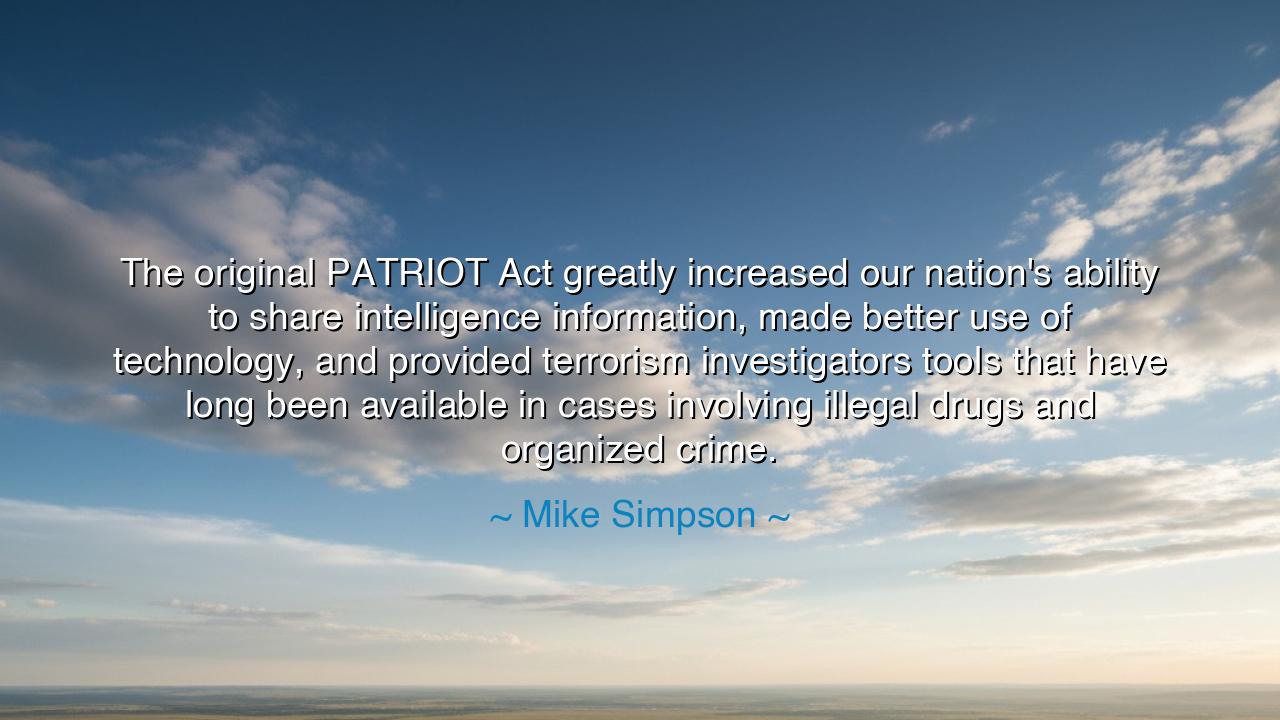
The original PATRIOT Act greatly increased our nation's ability
The original PATRIOT Act greatly increased our nation's ability to share intelligence information, made better use of technology, and provided terrorism investigators tools that have long been available in cases involving illegal drugs and organized crime.






“The original PATRIOT Act greatly increased our nation's ability to share intelligence information, made better use of technology, and provided terrorism investigators tools that have long been available in cases involving illegal drugs and organized crime.” Thus spoke Mike Simpson, a man who stood in the chamber of governance during one of the most turbulent chapters in modern history. His words recall a time of fear, urgency, and transformation — the early years of the twenty-first century, when the world’s sense of safety was shattered by the attacks of September 11, 2001. Out of the smoke of that day arose both grief and resolve, and from that resolve, the PATRIOT Act was born — a law meant to fortify the nation’s defenses and mend the weaknesses that had allowed such tragedy to unfold.
Simpson’s declaration is not a boast of power, but a reflection on adaptation — the timeless truth that in moments of great peril, a society must evolve or perish. The PATRIOT Act was forged in the crucible of necessity, granting agencies of intelligence and law enforcement the means to share knowledge, track threats, and act with swiftness. Before its passage, as other leaders like Robert Mueller have testified, barriers of secrecy and bureaucracy divided the guardians of the realm. Each agency held fragments of truth, yet none possessed the full picture. Thus, the enemy moved unseen, not because of strength, but because of our disunity. Simpson’s words remind us that wisdom in leadership often lies not in invention, but in connection — in the uniting of scattered strengths under a single purpose.
The act also represented a new era of technological warfare. The old tools of vigilance — surveillance, investigation, and communication — had become insufficient for an age where terror could cross oceans in an instant and hide within the invisible pathways of digital networks. Simpson’s praise of the Act’s embrace of technology speaks to a larger principle: that intelligence is not only the gathering of information, but the mastery of change. Just as the blacksmith of old learned to forge stronger steel when faced with new weapons, so too must nations sharpen their instruments of defense when the nature of threat transforms. The PATRIOT Act was, in that sense, not merely a law — it was a declaration of evolution, a vow that complacency would no longer be the guardian of peace.
Yet, woven within this transformation lies a tension as ancient as power itself — the struggle between security and liberty, between the shield that protects and the freedom it might restrain. The PATRIOT Act granted tools once reserved for the pursuit of criminals and cartels — wiretaps, surveillance orders, secret searches — to those now fighting the war on terror. Simpson, in naming this, acknowledged both the wisdom and the weight of such authority. For though these tools brought strength, they demanded vigilance of another kind — the moral vigilance to ensure that justice did not become tyranny. Thus, his words carry an unspoken warning: that every new power must be guided by conscience, every safeguard balanced by accountability.
This balance between safety and freedom has long been the measure of great nations. Consider the story of Rome, when after centuries of strength, it grew fearful of its enemies. To preserve itself, it armed its leaders with vast powers, eroding the very liberties that once made it mighty. The Republic, in defending itself, became an Empire — and the Empire, though strong, forgot its soul. The lesson is clear: security without virtue leads to decay, but virtue without security leads to ruin. Simpson’s reflection, then, is not merely political; it is philosophical. It reminds us that the tools of defense are only as noble as the hands that wield them.
In his words, one also senses a quiet reverence for the collaboration of human minds — for the truth that no single agency, no single man, can safeguard an entire civilization. The success of the PATRIOT Act lay not in its laws alone, but in the spirit of cooperation it sought to inspire. In that, it echoes an eternal principle of both war and wisdom: that unity multiplies strength. Just as the arrows of a nation cannot pierce the darkness unless they are drawn and aimed together, so too must intelligence, courage, and trust act in harmony to preserve the peace.
Therefore, O listener, take this lesson beyond the halls of government and into the realm of the soul. In your own life, as in the life of nations, you too must learn the art of balance — to be watchful without fear, to adapt without surrendering your values, to use knowledge not as a weapon of control, but as a tool of understanding. Let cooperation, discipline, and purpose be your shields against the chaos of the world. For as Mike Simpson reminds us, power gains meaning only when united with wisdom, and intelligence becomes salvation only when guided by virtue.
Thus, his words stand not only as a record of policy, but as a timeless parable: that in every generation, the defense of freedom demands both courage to act and humility to restrain. The PATRIOT Act, for all its controversy, was an emblem of that truth — that survival is born of adaptation, and adaptation must ever serve the higher cause of justice. Let this be the enduring lesson: that in moments of peril, when fear calls for force and liberty trembles, a people must remember that their greatest strength lies not in power alone, but in the wisdom to wield it rightly.






AAdministratorAdministrator
Welcome, honored guests. Please leave a comment, we will respond soon